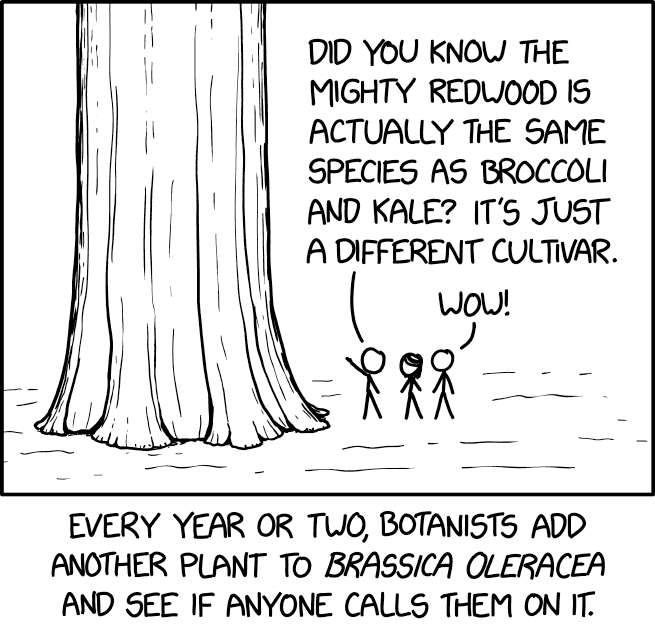this post was submitted on 23 Sep 2023
530 points (95.7% liked)
xkcd
8843 readers
110 users here now
A community for a webcomic of romance, sarcasm, math, and language.
founded 1 year ago
MODERATORS
you are viewing a single comment's thread
view the rest of the comments
view the rest of the comments

This is especially funny to me because I tell people all the time about kale being a man made (cultivated) plant from the wild mustard seed.
Is it not the case that kale, broccoli, cauliflower and cabbage are all basically derived from the same plant?
This is what I've been told, but I am very ignorant of such matters and while you will say that I can simply Google the issue, which is true, it's never been enough of a priority for me to do so, goddammit.
As for Sequoia sempervirens or Sequoiadendron giganteum being forms of broccoli, I do in fact know enough dendrology to know that it's bullshyte.
I hate when people say Google things, fuck off I'm here for the community.
Not to mention 99% of sites being ad-ridden bullshit while serious responses on forums tend to be short, sweet and more educational than searching
I just down vote then and ignore em lol
Yes, which is why this image is funny to me.
Fair play
I usually ask people to name a food stuff that hasn't been genetically manipulated in some way by human hands. You can't. There really are none. Even non-gmo food stuffs are still selectively bred or clonal species.
Blackberries have grown wild in Europe for thousands of years. The US ones have been messed with by farmers and scientists, but in the UK they're pretty much the original deal.
Yeah I was thinking about this recently. Wild blackberries you see all over the place growing like a weed are pretty much the exact same as the ones you see in a shop.
It's nothing like, say, apples, which have been changed a lot by humans.
Or wild (smaller) strawberries.
Same with lots of berries, like billberries, currants and raspberry.
Salt.
That’s just an edible rock.
So, not genetically manipulated, then. 🤷♂️
Fish.
Also macadamias, and lillipilli. And the cabbage tree palm. Warrigal Greens.
Coconuts, I expect.
I am yet to believe the humble blackberry is a cultivar.
Possibly kangaroo meat? Boomers such as the Eastern Grey are pretty unmanipulated, and taste like venison.
But mostly fish. And lobsters/crays/crabs.
Yeah, but not the Gen Z kangaroos. They've been manipulated by social media their entire lives. Some taste like beef, some taste like chicken, and some refuse to be eaten at all! When the older generations tell them to just let themselves be hunted, they say, "OK, Boomer!"
...The word has an alternate meaning here, but okay.
... I honestly can't tell if you think I didn't get that when I made a joke (apparently not a good one, judging from the downvotes) based on the double meaning, or if you are making a really, really dry joke in return. If it's the latter, nicely done!
Wild fish and game come to mind
You could probably make an argument that we've still put some sort of evolutionary pressure on game animals and affected the course of their evolution, though definitely on a much smaller scale than with the animals we have deliberately bred.
One example is there's a mutation in African elephants that causes females to not have tusks, that gene has been around for a long time, there has pretty much always been some portion of female African elephants without tusks (Asian elephant females are usually tuskless or have very small tusks,) but because of ivory poaching we're seeing more of those tuskless females than in the past in a lot of populations, because the tuskless females have more opportunities to reproduce and pass on their genes since they're less likely to be targeted by poachers.
There are probably more examples, and a lot of them are probably a lot more subtle.
I debated on whether or not to list these, because the actual science to back them up is spotty at best, but I think they help to illustrate the kinds of effects we could potentially have on a non-domesticated species. Some people think deer antlers are shrinking due to hunting pressure, and that rattlesnakes have smaller rattles or rattle less than they used to because the ones that make a lot of noise are more likely to be noticed and killed by humans. Again the actual science to back those claims up is lacking, and even if they are happening, which isn't a given, there's a lot potential explanations like environmental factors that may be separate from evolutionary pressure.
I suppose the only one where the foodstuffs argument would kinda fit is the deer, but then people that eat them go for overall animal size as opposed to just the antlers.
Wild venison?
Presumably invented by someone who hates food that tastes good.
You haven't had the right kale. The stuff they use for chips and salad is way too fibrous, but there are varieties that taste and feel a lot better.
Kale is what food eats.